In matters of style, swim with the current; in matters of principle, stand like a rock.
-Thomas Jefferson


In matters of style, swim with the current; in matters of principle, stand like a rock.
-Thomas Jefferson

Here’s an icky confession: I used to dread Mother’s Day.
When I first became a mother, the holiday somehow left me feeling unappreciated. I tended to get in a funk, and not out of grief or some sort of well-defined pain — I can only imagine how hard Mother’s Day must be for someone who has lost their mother. I felt bad in a bratty way, like a toddler who is pissed that she’s not getting what she wants. The worst version of myself has typically made her appearance, ironically, on the day that we were supposed to be celebrating my best, most beloved, self.
What is it that left me so resentful on Mother’s Day? What did I want so much that I wasn’t getting?
Until a couple of years ago, I thought it was about gratitude. I wanted to be appreciated on Mother’s Day in the way that we used to show appreciation to my mother. Research shows that when we express gratitude in our relationships, we become more attuned to our family member’s efforts on our behalf. I was hoping for a little more attunement to all the work I do as a mom — mostly from my husband, but also the kids.
At least the way I remember it (I’m a little afraid to ask my mom for verification; it just now occurred to me that my memory is probably a little rosy), we’d bring my mom breakfast in bed, showering her with homemade cards and gifts. My dad would give my mom a funny card and a gift that he’d bought. We’d take a family bike ride on the path around St. Mary’s College, with a picnic that my dad and I packed with help from the deli at Black’s Market. Norman Rockwell could’ve painted us.
None of that actually seems hard to recreate, but for the love of God my family has never even come close. The worst Mother’s Day I ever had was the year that I lowered my expectations and then laid them out clearly for my husband. “I’m fine with no gifts,” I explained, “So long as there are cards and a family activity.” This did not happen.
For the record, three of the four children made me BEAUTIFUL, heartfelt Mother’s Day cards. They were practically set to music they were so thoughtful and moving.
But that was not enough for me.
Expectations, even low ones, are a tricky thing. Unfulfilled, they set us up to ruin what is actually happening by ruminating over what we think ought to be happening. Painful thoughts — How could he not do this for me given all I do for this family??! Does he not appreciate me at all? — start to loop endlessly, triggering waves of disappointment.
So how could I, once and for all, make Mother’s Day different? I had already lowered my expectations to no material gifts, and that didn’t help me much; I’m not sure I can lower them to nothing. In past years, I’ve made a massive effort to focus on myself less by helping others, but ultimately, even that didn’t really prevent me from feeling unappreciated myself. I felt entitled to a little gratitude, dammit.
(Let’s not miss the irony here: Entitlement is the opposite of gratitude. Rarely do we attract the opposite of what we feel. Just as we don’t foster other people’s love by lashing out at them, my unbridled sense of entitlement wasn’t exactly generating a mountain of appreciation.)
Emotional traps like this — obsessing over my feelings of unmet expectations — are usually triggered by a mistaken belief. So where was the error in my thinking?
I really was feeling unappreciated by my husband, Mark. I felt like I sacrificed more for our family and children, and that he should recognize and feel grateful for that. I held a deep seated conviction that I gave more. I spent more time doing the hardest parenting work, creating and enforcing structure and discipline, managing the near-constant drama of life with three teenage girls and an active adolescent boy.
Now, I should mention that, according to research, I am not alone in believing that I do more for our family than Mark — but I might not be correct. When researchers add up the percent of work each person in a couple says he or she does, they consistently find that the total ends up being more than 100 percent. So if a mom says she does 65 percent of the household work, and her husband says he contributes a solid 50 percent . . . there is a 15 percent error in there somewhere. Perhaps this was the heart of my mistaken belief?
My Mother’s Day funk did grow out of my belief that I do and sacrifice more for our family than my husband does. And weirdly, I somehow thought that this seemingly massive imbalance could be righted through a Mother’s Day display of profound appreciation.
This is funny to me now, because clearly even the most magical Mother’s Day outing would not dissolve my resentment. We needed to deal with the source of my bitterness.
“We need counseling,” I announced to Mark. I sat down to work through what I wanted help resolving. What did I want Mark to do differently?
What I found, when I really thought hard about it, was that my assumptions about our division of labor were blatantly untrue. Believe me, I was shocked by this revelation. But it turned out that I had loads of evidence suggesting I don’t do more for our family than Mark.
True, I do the bulk of the emotional labor. But he does nearly all the house and garden maintenance. We spend about the same amount of time in the car driving kids around. I plan our meals and cook; he shops and cleans up. We’ve got a division of labor where he does the things he likes to do best (like mowing the lawn) while I get to do the things that I love to do (like talking to the kids about their feelings). I am lucky to have a truly equal partnership.
At times, being a mother can feel so overwhelming; when the kids were little, I sometimes felt a little victimized by it all, a little trapped by the sheer magnitude of the way they’d taken over my life. My husband simply couldn’t do many of the things that I was doing. Pregnancy, labor and delivery, and breastfeeding bred loads of occasions when only mama would do. My family could never repay me for the sacrifices I’d made for them — but they could, and should, show me a little gratitude for it. Hence my feelings of entitlement to a little Mother’s Day appreciation.
Billy Collin’s wrote a poem about this. In it, Collins recounts the thousands of meals his mom made him, and the good education she provided, and all the other zillions of things she did for him. In return he gave her . . . a lanyard he made at camp. Collins concludes:
And here, I wish to say to her now,
is a smaller gift—not the worn truth
that you can never repay your mother,
but the rueful admission that when she took
the two-tone lanyard from my hand,
I was as sure as a boy could be
that this useless, worthless thing I wove
out of boredom would be enough to make us even.”
Because I am not trapped. I have not been victimized. There is no need for reparation. You don’t owe me a darn thing, even gratitude. I don’t have to do any of the many things I do for you or our family. I choose to do them. I do them because I love each of you so very much. Moreover, this love that I feel for you is the greatest gift I’ve ever been given. It is a great joy to be a mother in this family, your family. I’m deeply, profoundly grateful for all we are and all we have — together.
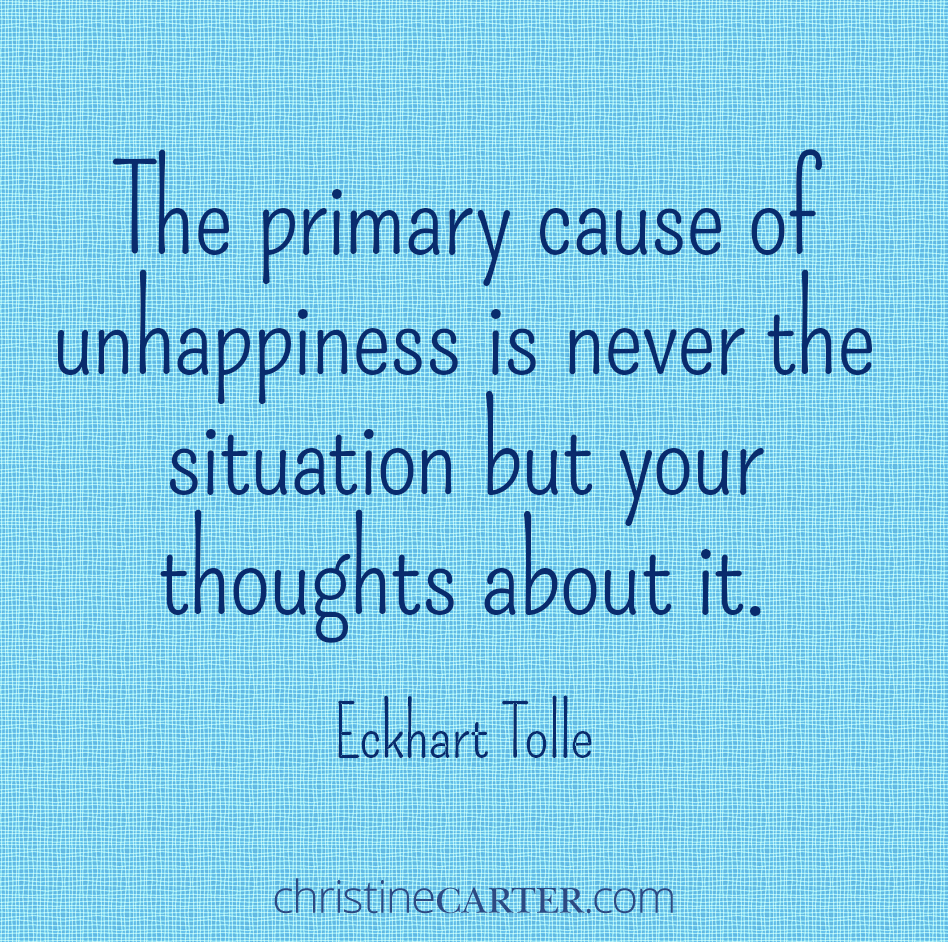
“The primary cause of unhappiness is never the situation but your thoughts about it.”
–Eckhart Tolle
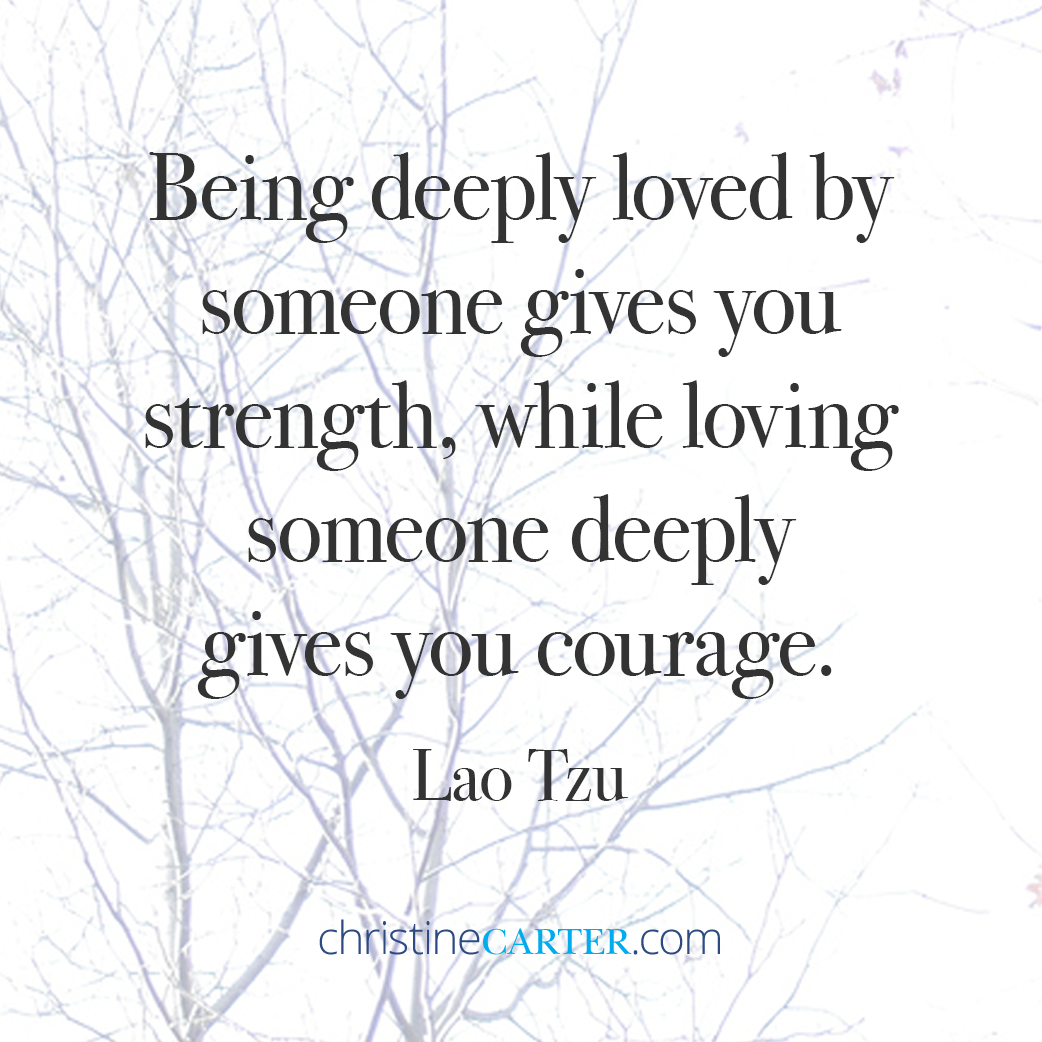
Being deeply loved by someone gives you strength, while loving someone deeply gives you courage.
Lao Tzu
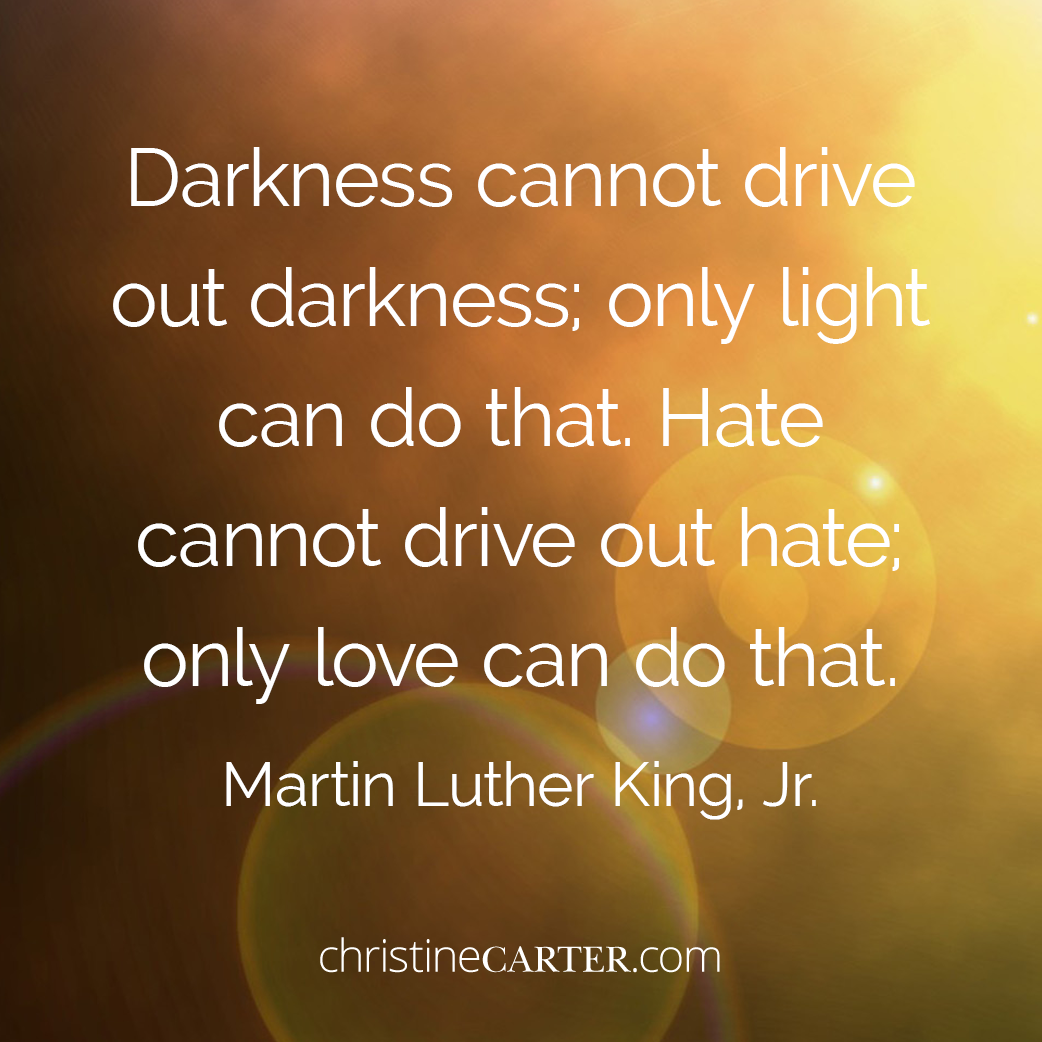
“Darkness cannot drive out darkness; only light can do that. Hate cannot drive out hate; only love can do that.”
Martin Luther King, Jr.
![A society grows great when old [people] plant trees whose shade they know they shall never sit in. - Greek Proverb -](https://www.christinecarter.com/wp-content/uploads/2018/03/christine_carter_thursday_thought_greek_proverb.png)
“A society grows great when old [people] plant trees whose shade they know they shall never sit in.”
Greek Proverb

A sociologist and senior fellow at UC Berkeley’s Greater Good Science Center, Christine Carter, Ph.D., is the author of The Sweet Spot: How to Find Your Groove at Home and Work (January 2015) and Raising Happiness (2011).
After receiving her B.A. from Dartmouth College, where she was a Senior Fellow, Dr. Carter worked in marketing management and school administration, going on to receive her Ph.D. in sociology from UC Berkeley. A sought after keynote speaker, Dr. Carter loves to share her work with new audiences. Combining scientific research and practical application, she offers audiences not only a way to cope with modern pressures, but a way to truly thrive. Speaking to executives, general audiences, and parents, Dr. Carter looks at living life from your “sweet spot”—that place of both power and ease.
Dr. Carter also writes an award-winning blog, which is frequently syndicated on the Greater Good Science Center, HuffingtonPost, PsychologyToday.com, Positively Positive, Medium, and several other websites. She has twice been nominated for an award from the American Sociological Association for public sociology.
Dr. Carter has been quoted or featured in The New York Times, The Los Angeles Times, USA Today, The Chicago Tribune, The San Francisco Chronicle, The Washington Post, The Boston Globe, The NewYorkTimes.com as well as Real Simple, Good Housekeeping, Parenting, Men’s Health, Martha Stewart’s Whole Living, Fitness, Redbook, and dozens of other publications. She has appeared on the “Oprah Winfrey Show,” the “Dr. Oz Show”, the “TODAY” show, the “Rachael Ray Show,” “The Daily Show with Jon Stewart,” “CBS Sunday Morning,” “ABC World News with Diane Sawyer”, PBS, as well as NPR and BBC Radio.
She lives with her husband, four kids, and dog Buster in Marin County, California.
This post is taken from “The Raising Happiness Homestudy,” an online course I created as a companion to my book Raising Happiness: 10 Simple Steps for More Joyful Kids and Happier Parents. I’m sharing one “class” from this online course per week here, on my blog. Want to see previous posts? Just click this Raising Happiness Homestudy tag. Enjoy!
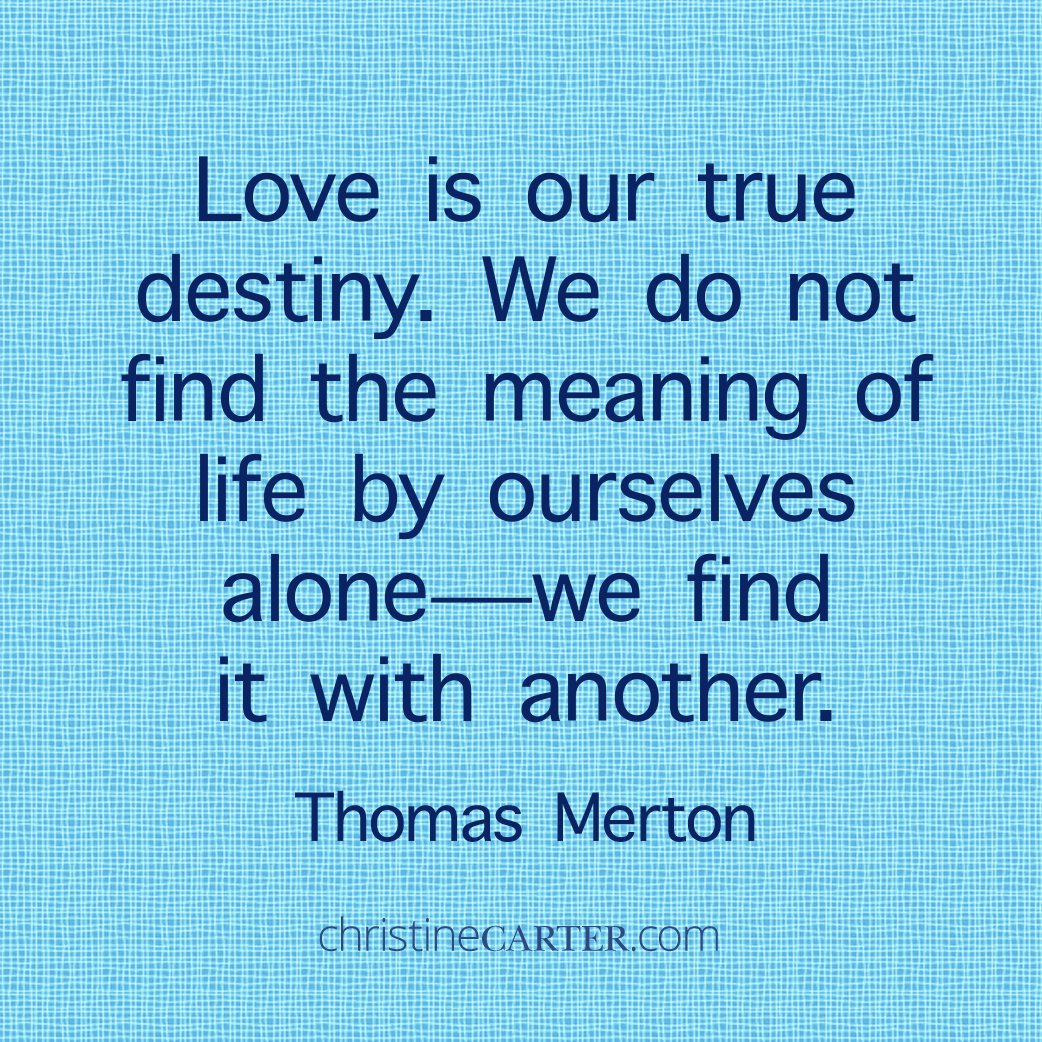
Love is our true destiny. We do not find the meaning of life by ourselves alone – we find it with another.
Thomas Merton

Last autumn, horrific wildfires raged near our home. People we knew were losing their houses left and right. In the midst of disaster, I had to leave town for work.
To make myself feel better, I typed up three single-spaced pages of detailed instructions for what my family should do in case of fire or earthquake. Which I then laminated. And posted in each of my kids’ bedrooms.
I then made my family practice an emergency evacuation. Tanner, age 15, volunteered to take care of the family heirlooms. I drilled him, dead serious: “Which are the high-priority photo albums?” Molly, 14, was drawing on her ankle with a ballpoint pen. “Molly! Pay attention! When you get Buster into the car, what else do you need to make sure you have with you?”
My husband rolled his eyes.
Until recently, I’d thought that I’d more or less conquered perfectionism. Perfectionism, I’d become fond of saying, is a particular form of unhappiness. I’d thank GOD I wasn’t a perfectionist anymore.
Hah.
While it is true that I am no longer as afraid of making mistakes or disappointing others as I was in my youth, I have obviously not yet rid myself of perfectionism. I’ve just turned it outward, to the world, and especially to others. How am I trying to solve this problem of mine? Read on.
The more turbulent I am inside, the more I try to control what’s happening outside. Some people look away when chaos reigns; I dig in. I boss people around. I am aggressive about what I think is right.
Feeling like I am right, like I know what to do, delivers a hit of certainty in a world of unending and catastrophic natural disasters, in a country where mass shootings are commonplace and our hot-headed president brags about his ability to start a nuclear war.
But every time I try to control anything other than my own thoughts—the weather, my husband, my children—I’m sending a message to the world and the people around me that they are not good enough. This absolutely is perfectionism, and indeed, it is a particular form of unhappiness—one that spreads like wildfire.
This control freakish-ness indicates that I have problem with what researchers call “other-oriented perfectionism.”
I’m not alone. A new study published in Psychological Bulletin demonstrates that perfectionism is increasing over time: Today’s youth are more demanding of others, and they are more demanding of themselves. They also feel like other people (e.g., parents like me) are more demanding of them.
Like its close cousins “self-oriented perfectionism” and “socially prescribed perfectionism,” other-oriented perfectionism leads to nothing good. Although we often think that perfectionism is a cause of success—“I’m a bit of a perfectionist” is a socially acceptable humble-brag—research clearly demonstrates that perfectionism is often debilitating. A well-studied phenomenon, perfectionism is clearly associated with serious depression, chronic anxiety, and myriad health problems.
And “other-oriented perfectionism” comes with additional drawbacks: In intimate relationships, it is linked with “greater conflict and lower sexual satisfaction.” When I get bossy and controlling, the people around me feel defensive, or they feel wrong, or they feel a lack of control—nothing anyone ever wants to feel.
Being controlling is like a sugar rush: It might bring me a quick hit of tense certainty, but never lasting peace. This is because all control is false. Temporary at best. Life is inherently uncertain. We might hate that, but it’s true. We can be sure of only one thing: We will die. And we are usually not even in control of that.
Given this, why do I so consistently and diligently resist uncertainty by trying to get the world to do things my way? And what can I do instead of retreating back into perfectionism?
The opposite of perfectionism is acceptance. Not resignation, but surrender…to whatever is happening in the present moment. I know, I know: That sounds terrible to my fellow control freaks. Bear with me.
You may have heard the truism that what we resist, persists. This teaches us that we often prolong pain and difficulty through resistance. Perfectionism is a form of resistance to whatever is actually happening in the present moment. At its foundation, it is a rejection of the current reality.
Research by Kristin Neff and others shows that resistance increases our suffering, while acceptance—particularly self-acceptance—is one of the lesser-known secrets to happiness.
But this idea that we do better when we don’t resist difficulty is very counterintuitive. How do we even begin to stop resisting what hurts or what scares us?
Behavioral science and great wisdom traditions both point us towards acceptance. It is strangely effective to simply accept that which we cannot control, especially if we are in a difficult or painful situation. To do this, we accept the situation, and also our emotions about the situation.
Instead of laminating instructions for exactly what to do during a disaster (because, you know, when the house is on fire that’s just what everyone needs), I could have let myself accept reality: We could, at some point, lose our home in a fire. And then I could just let myself feel the fear and anxiety I was actually already feeling.
This approach requires trust. Trust that if I’m still here, still breathing, everything is okay. Trust that even if I don’t give specific instructions, if I back off from trying to control everyone and everything, life will continue to unfold just as it’s meant to. Trust that even if it all goes to hell, even if other people make mistakes or do things differently than I would do them, that I can deal with the outcome, no matter what it is. Trust that I can handle all the difficult emotions that come up in response to what does or does not happen. Trust that I can handle loss and grief should it come.
“You know what to do now, in a fire or an earthquake?” I asked the kids a few weeks later.
“Pretty much,” Molly answered, looking up.
“What?” I asked.
“Depends what we’re dealing with. I’m in charge of Buster. I’ll get him to the meeting place.”
This is a good-enough plan…even though it does not account for some critical details.
Weirdly, this trust and acceptance thing works. When we suppress or deny our emotions (or distract ourselves from them by writing and laminating instruction manuals), they don’t actually go away. In fact, they tend to generate an even bigger physiological response, which makes us more, not less, anxious. But when we let ourselves feel what we feel, we can process what is happening for us. We don’t feel fewer challenging emotions, but we do feel them for less time.
For example, we might have a particularly difficult relationship with a neighbor or in-law. We can accept this as our reality, and also that we feel frustrated and saddened by the situation. This doesn’t mean that the situation will never get better; acceptance is not the same as resignation. We can work to make the relationship less difficult (or to be reasonably prepared in the event of a disaster), while at the same time accepting the reality that the relationship is very difficult. Maybe it will get better—and maybe it won’t.
Accepting the reality of a difficult or scary situation and our limited control allows us to soften. And this softening opens the door to our own compassion and wisdom.
And in this crazy and uncertain life, we human beings need those things.
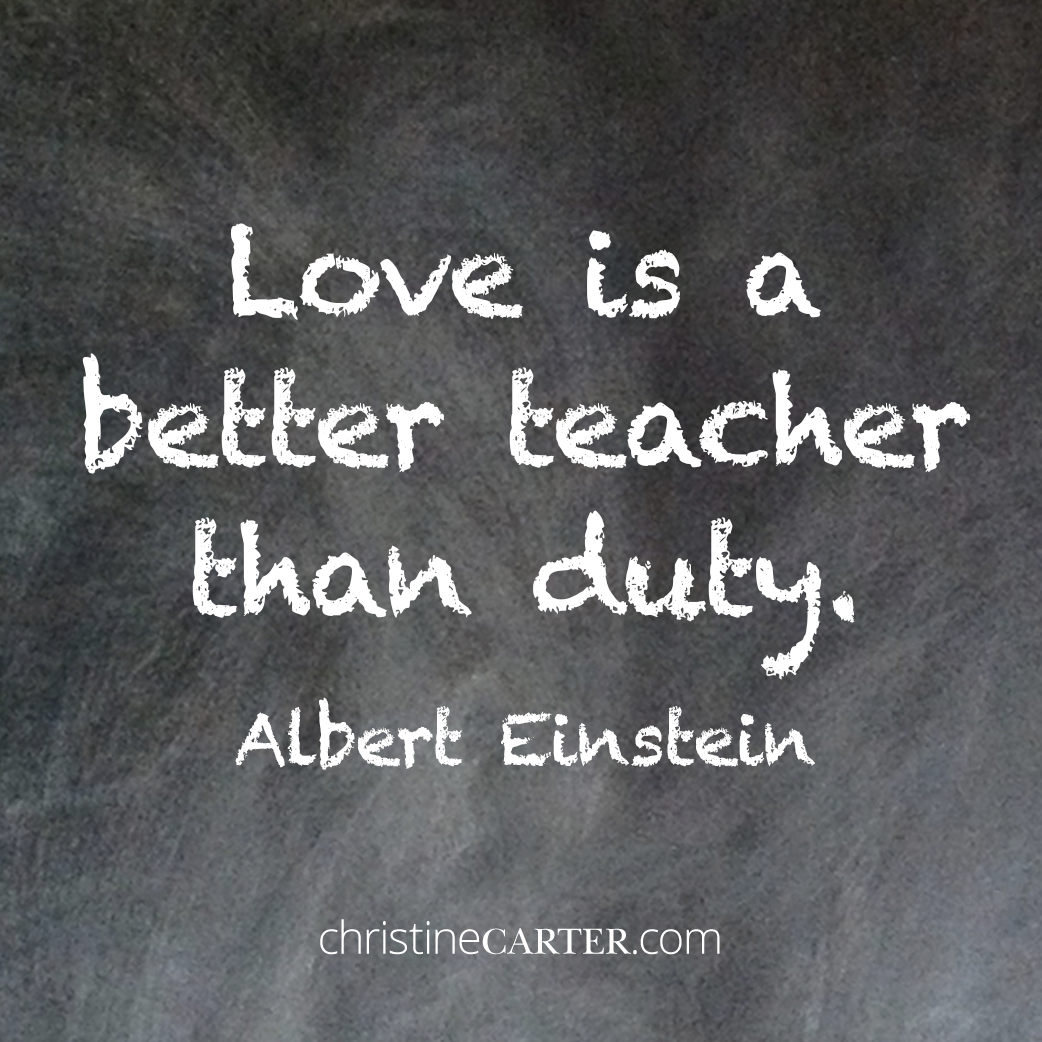
Love is a better teacher than duty.
Albert Einstein